It’s a common scene in coffee shops across the globe: a few friends discussing how to stop being stuck in the 9-to-5. ‘Start your own thing!’ claims one, drinking a hot latte. ‘Hey, what about those commercials on earning thousands of dollars working from home?’ says another, sparking interest in making money online. They’re probably talking about MLM and affiliate marketing, the two most popular sources for a fancy online income. However, despite similar interests, these are pretty different directions to make money online.
Somewhere around the table, a common friend, Lucy, is beaten by a desire to earn a profit from the comfort of her own pace and place. She has discovered two possible ways to make some money online: affiliate marketing and MLM, and now she is unsure which one to actually consider. Let’s break down these options using Lucy’s journey as our guide.
Affiliate Marketing:
Lucy starts with affiliate marketing. She has a popular cooking blog and a fan page on social networks, and she uses them to promote high-quality, gourmet kitchen tools. She shares special links to the online stores she collaborates with on her blog. Once they click on that link and buy what they like, Lucy gets a commission, which is fantastic—she can profit from anything her audience buys without ever having to have an inventory, ship products, or provide customer service. Lucy is paid solely for promoting the product and attracting traffic and sales.
What is affiliate marketing?
Affiliate marketing is a modern advertising model through which a company compensates third-party publishers to create traffic or leads for its products and services. The third-party publishers are known as affiliates, and the compensation fee incentivizes them to come up with ways to market the company.
Multi-Level Marketing (MLM):
Lucy then gets into MLM. She has found a company that sells a variety of health and wellness products. First, this is quite similar to affiliate marketing in the way that she sells their products to her friends and family. However, the key difference is that Lucy also wants them to begin selling those products and become part of her sales team. Lucy is the distributor for the network. Every person that Lucy has brought to the company and the sales they have made directly lead Lucy to get additional commission. Her income requires that she be able to do this and also sell the product. Success here depends on her sales skills and also on how well she can build and motivate her team. In other words, she needs to be able to build her 'downline’, to use MLM vocabulary.
What is MLM?
Multi-level marketing refers to a business model ,in which unsalaried sales representatives act as a hierarchy, sell goods or services to the public, while recruiting additional people to sell the same products or services.
Through Lucy's experiences, it becomes evident that for those who prefer focusing on marketing and sales through existing platforms without the pressure of recruitment, affiliate marketing might be more appealing. Of course, it is true that MLM could attract those who are good at direct sales and building networks. However, recruitment is always a point of concern.
Both methods have their pros and cons. To finalize the choice, Lucy should consider additional aspects such as investment requirements, approximate income, capability to ensure marketing or manage sales, and willingness to take risks.
In the next sections, we will compare each structure based on these aspects. This will assist Lucy, and readers thinking about getting involved in either business, to make a decision that matches their wishes and abilities.
Start-up costs and financial risks
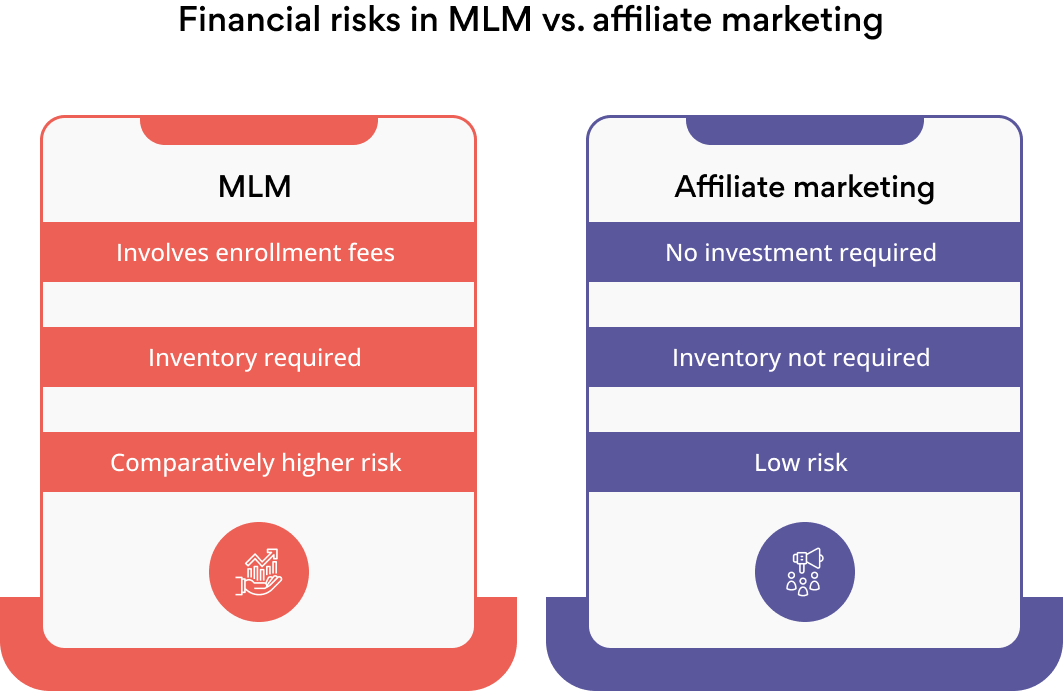
You can start organizing your affiliate marketing with little to no money. Whether you’re starting a website, blog, or social media account, these can be quite inexpensive. Your YouTube channel or other social media sites might even be free. The most significant expense here is your time, spent creating content and getting people to click on your affiliate link. However, this is low risk since most affiliate programs are free to join, and you don’t need to buy inventory. As your audience grows, your potential earnings increase without adding much financial burden.
Consider starting an MLM business. Note, however, that there are many one-time fees associated with getting it up and running. You may need a start-up kit or inventory kit, and what’s included may vary in price. Kits often incorporate a few samples of the company’s product and some marketing materials, and you may have to pay for training or registration. There is also the risk of not being able to sell everything you purchase or recruit enough people, which can lead to a significant loss if your investment doesn’t pay off.
When deciding which business strategy is ideal for you based on the financials, consider this: Do you have little money to start with and want to avoid risking your income? If yes, affiliate marketing is the best approach. If you have a substantial amount of money and are willing to take bigger risks, MLM might be a better option.
Earning potential and income structure
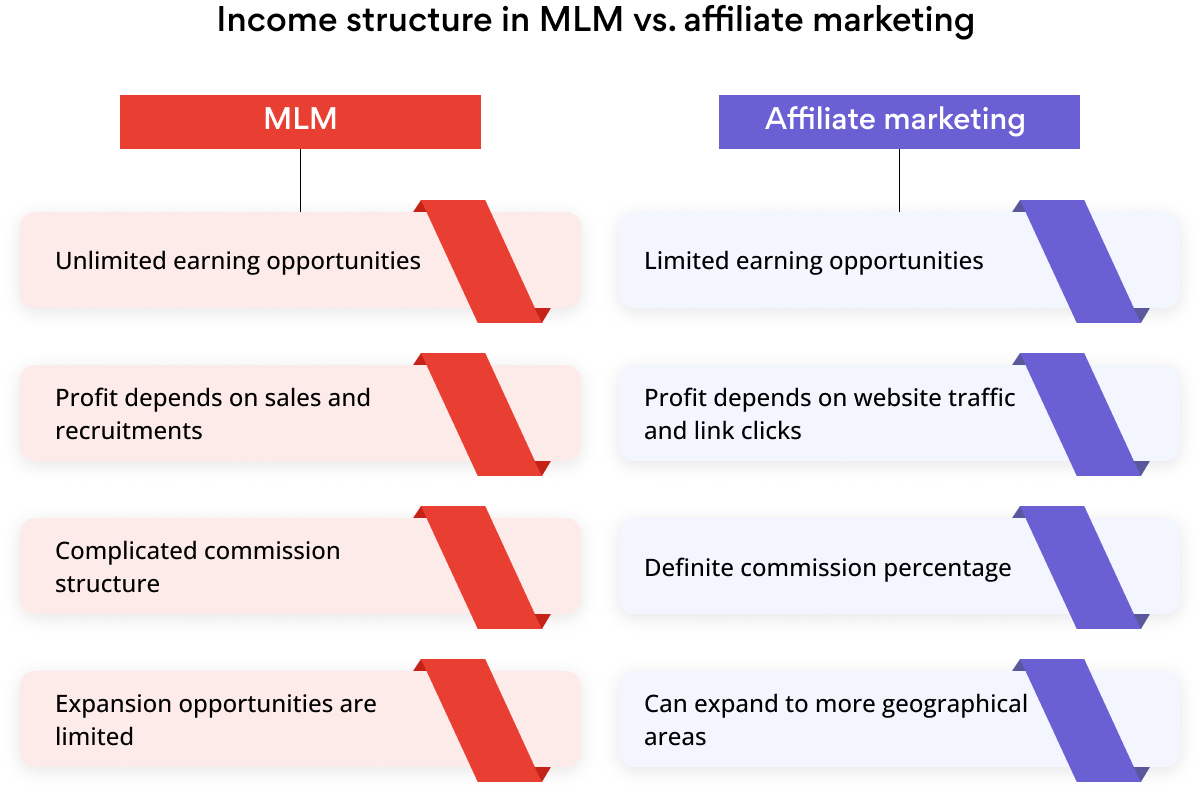
When it comes to affiliate marketing, the sky’s the limit on what you can earn, but it all comes back to how much traffic you’re able to pull in and how many sales you are able to close. The more people you can get to click on the links, the more you will be able to earn. This is because you’re making a certain percentage of every sale made through your affiliate link—no complicated structures, just straight commission. It’s particularly lucrative for those who can get into high-value niches or already have a flourishing follower base. This is also something that can be scaled up. You could make more money by promoting more items, expanding into more geographic areas, or optimizing your marketing strategies to get more from every investment.
On the other hand, the picture is quite different in MLM. Although there is still the opportunity to make good money, many people feel their wallets are tight. This is because your business's profit depends on your ability to sell products and bring new distributors into the business. These people that you see making big money are the ones with hundreds or thousands of downlines, making money from everyone’s sales. The income structure is definitely a bit more complicated. It operates on a multi-tiered basis, where the amount you earn will not depend on the amount you sell but on the number and performance of those you recruit and who recruits more. There are usually various achievement levels that determine your income from commissions and bonuses. To keep your earnings growing, you should be in constant recruitment, so it’s a bit shaky and unsure for many people.
Flexibility and product selection
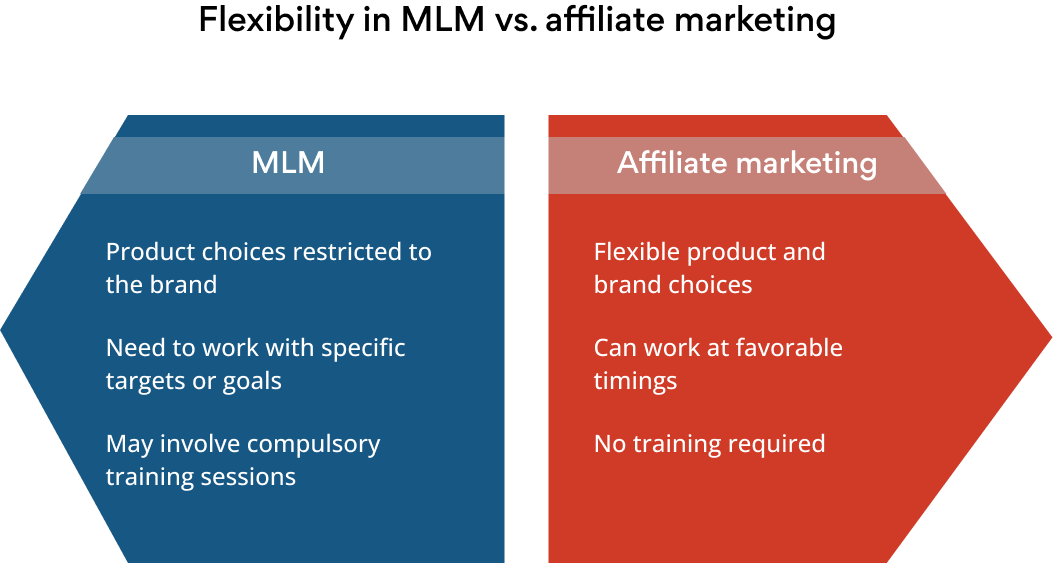
Affiliate marketing is ideal for those who prefer to set up their own rules. You are capable of working from home, at any time you want, customizing your effort and streamlining it through marketing. It is possible to adapt your business to suit your market opportunity and lifestyle. It works nicely for someone who needs a business opportunity that can adapt based on their circumstance that can expand during peak seasons or scale down during quieter times. Regarding the products you would like to market, it already has several options to offer to your audience. This helps to create your own customized product sales in a rapidly changing market. It allows for easy merchandise switches to accommodate new trends to keep your business evergreen.
MLM on the other hand has its own considerations. Although it comes with the unintentional schedules and frameworks, regular meetings, and even training, it perhaps offers you a structured guideline. If you highly prefer a structured way of doing your daily duty, the schedule and frameworks will be well set to give you what you need. It can also make you feel part of a community if you’re still new in the business or, depending on how you like doing your stuff. This contrasts with the freedom of setting your own schedule, which may not be as appealing. It goes against what you may want according to your plans. Thus, the idea of focus could be propelled and intensified, depending on what your agenda looks like. Hence, the level of freedom in MLM is limited compared to affiliate marketing.
Income sustainability and scalability

One of the big pluses of affiliate marketing is the potential for sustainable income. Once you set up your digital platforms—be it blog articles, social media, or videos—they can keep making money long after you've posted them. This happens because digital content can continue to attract traffic and increase sales over time, especially if it stays relevant to your audience. This kind of passive income is a major draw for those looking to earn without constant hands-on effort.
Affiliate marketing ranks high in terms of scalability. It is relatively easy to expand your operations. You can promote more products, explore new markets, or optimize your existing marketing efforts to increase conversion rates. Because everything is online, scaling up usually does not require a big increase in costs or effort. This makes it easier to grow your earnings as your audience expands.
MLM offers a different kind of opportunity for income sustainability and scalability. While it’s true that MLM income depends heavily on active selling and recruiting, this can lead to substantial and sustained earnings for those who are skilled at network building and sales. The challenge is to keep your distributor network active and engaged, which can be a dynamic and rewarding endeavor.
Scaling up an MLM business has its challenges, but it has some potential rewards as well. It requires not just selling products but also expands to manage your distributor network. Successful MLM distributors often excel in team leadership and development—skills of high value in many areas of business. Leading a bigger team does take great work, but it also starts laying down the foundation for potentially bigger earnings as your network grows. The real key to MLM success is always to motivate and support your team. With that, you will be able to develop a strengthened, sustained income stream over time.
Personal commitment and social dynamics
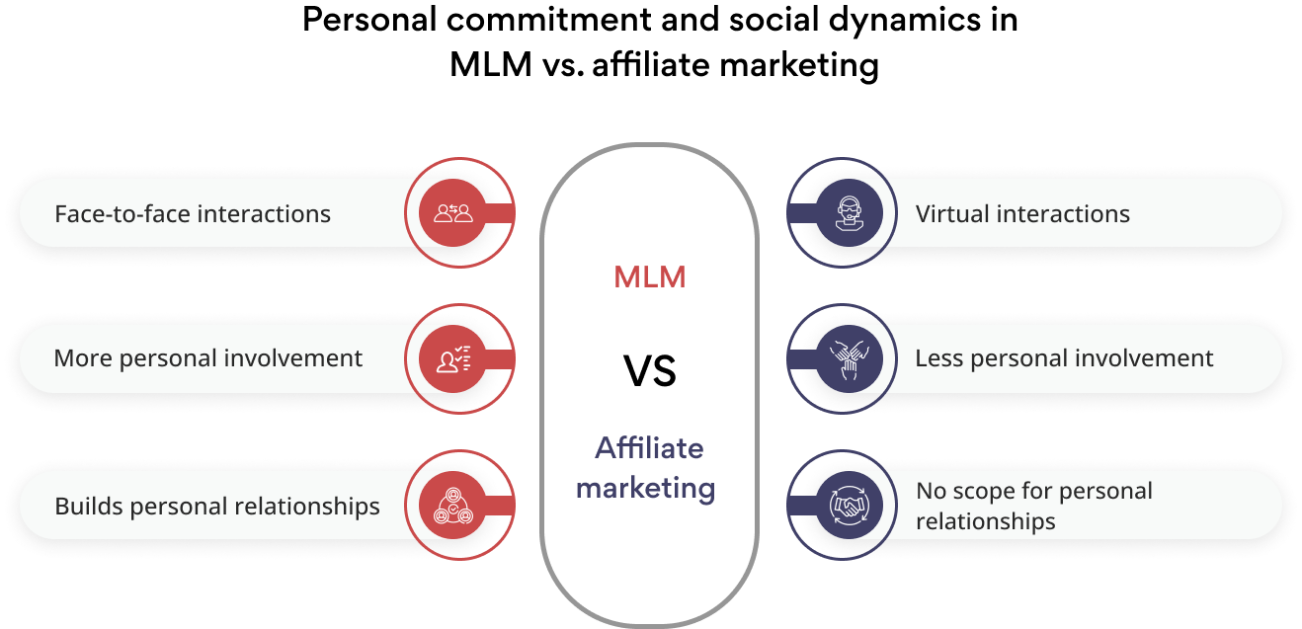
Affiliate marketing only works if it is taken seriously, with dedication and a passion for making a name and presence, digitally. Whether you're blogging, updating your status, or uploading video to YouTube, much of the material you're creating will be content creation designed to win over and engage audiences. The whole process involves a lot of behind-the-scenes work, like search engine optimization and planning marketing strategies. For those preferring to work independently or from remote locations with little face-to-face interaction, this is a nice way out.
It leaves the door open for flexibility on how and when you can communicate with your audience, preferably through comments posted on your online platforms, emails, or social media. The social interactions in the affiliate marketing mostly take place online. You could respond to comments, interact in forums, or manage a community via digital platforms. It is a friendly setup to people who are comfortable interacting virtually and who are not ready to engage too frequently in environments for personal or direct selling.
MLM, on the other hand, requires a higher level of personal involvement than sales alone. You are likely to spend much of your time attending meetings, training sessions, and promotional events if you are part of an MLM business. Not only does this require a greater commitment of time, but many of these activities will be undertaken in person.
MLM taps into close personal relationships and obviously needs a high degree of social interaction. Much of your success will depend on your ability to relate to others, create a network, and maintain those connections. This requires a substantial amount of direct selling and working on networks of employees or associates. If you like working in social situations and are comfortable with the complexities of leadership or mentorship, this may be a good option for you. Beyond the business, the interpersonal skills you gain can be invaluable.
Training and support
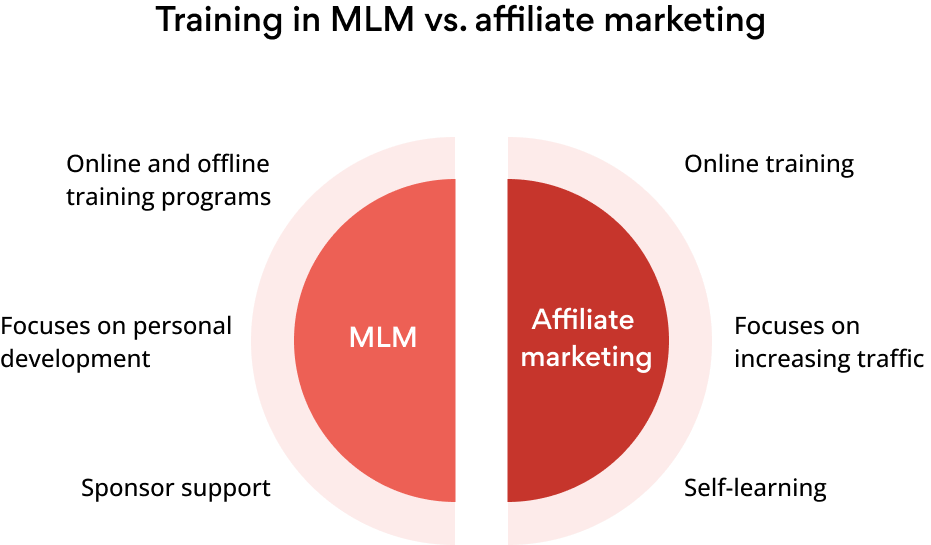
Support and training for affiliate marketing are mostly done on platforms or networks hosted by the given affiliate program. Training is offered in the form of learning tools, mostly tutorials, webinars, and exhaustive guides on effective practices in online marketing. The training includes how-tos on creating compelling content, optimizing for search, and data analysis that will help you fine-tune your marketing efforts. Generally, support in an MLM setting is more individualized and continuous. Support from affiliate networks is available, but it is mostly about solving technical issues and not providing one-on-one marketing guidance. Therefore, affiliate marketers often use online communities, blogs, and forums to swap tips and strategies amongst themselves. That is why it is a great environment for independent learners who can excel in self-directed education.
MLM training and support differ from how affiliate marketing operates. New distributors get extensive training, including deep dives into product knowledge and familiarization, sales techniques, and recruitment strategies. The companies often hold workshops, seminars, and even large-scale conferences just to ensure their distributors are better prepared to succeed.
Most MLMs will have MLM mentors or uplines who will help a new distributor through the sale and even explain the company’s compensation plan. The uplines will share the strategies used to recruit new distributors. Having such support is of great advantage to those who thrive in structured learning and have mentors’ level of support in building their businesses.
Technological support
Technology has substantially contributed to the success of affiliate marketing. For instance, affiliate marketing has integrated with ecommerce platforms such as Amazon and Shopify, which is a major win. With an established platform, an affiliate can market products to millions of potential customers. Moreover, these platforms have developed trust with customers and consumers, which has increased the conversion rates.
It is evident that artificial intelligence has revolutionized the field of affiliate marketing. AI technology helps to improve several aspects of a marketing campaign. Affiliate marketing utilizes AI algorithms to increase customer conversion rates by predicting human behavior and working in many human areas to automate some processes involved in marketing and sales, like creating content and nurturing leads. Thus affiliate-based marketers have a minimal focus on the tools and more on creating relationships, as they have an AI process guiding them all through.
On the other hand, MLM cannot work without highly specialized MLM Software. The model’s complex structure may make it impossible to operate without software. For instance, the system supports a broad network. It also has to factor in all downlines, sales, and compensation data and ensure the business operates effectively. This also comes with the additional challenge of ensuring that the software system is working effectively around the clock.
However, some businesses go for a hybrid model, creating a powerful combo of the two. This makes it leverage the positives of both the models resulting in expanded brand reach and increased sales. The complexities of combining the models may pose several challenges in managing the business. But with an MLM affiliate marketing software, businesses can efficiently handle the extensive MLM network and their growing affiliate network.
We can also observe how technology enhances MLM. With the use of platforms such as Zoom, MLM companies can arrange online training and recruitment. Thus, there is no physical connection needed, which means that you can easily scale your operations to support a larger network. New distributors can not only attend training from anywhere, but they can also get the support they need to get up to speed and feel like they are already a part of your team.
Discover how we build resilient businesses with advanced MLM functionalities
Final thoughts
When you choose a passive income stream between MLM and affiliate marketing, it is essential to pay attention to your personal preferences, level of commitment, and method of interacting with other people. Affiliate marketing is more laidback, suitable for those who would like to be more independent and distance themselves physically, even utilizing the digital environment. In contrast, MLM is more time-consuming and definitely more face-to-face, selling the product directly to others.
In this blog, we took an extensive look at some of the major similarities and differences in order to help you make an informed decision based on what most resonates with you and your goals or lifestyle. Whether you choose the independence of affiliate marketing or the structured community of MLM, knowing the demands and benefits of each will be the first step in the successful incorporation of a passive income stream of your own.









Leave your comment
Fill up and remark your valuable comment.